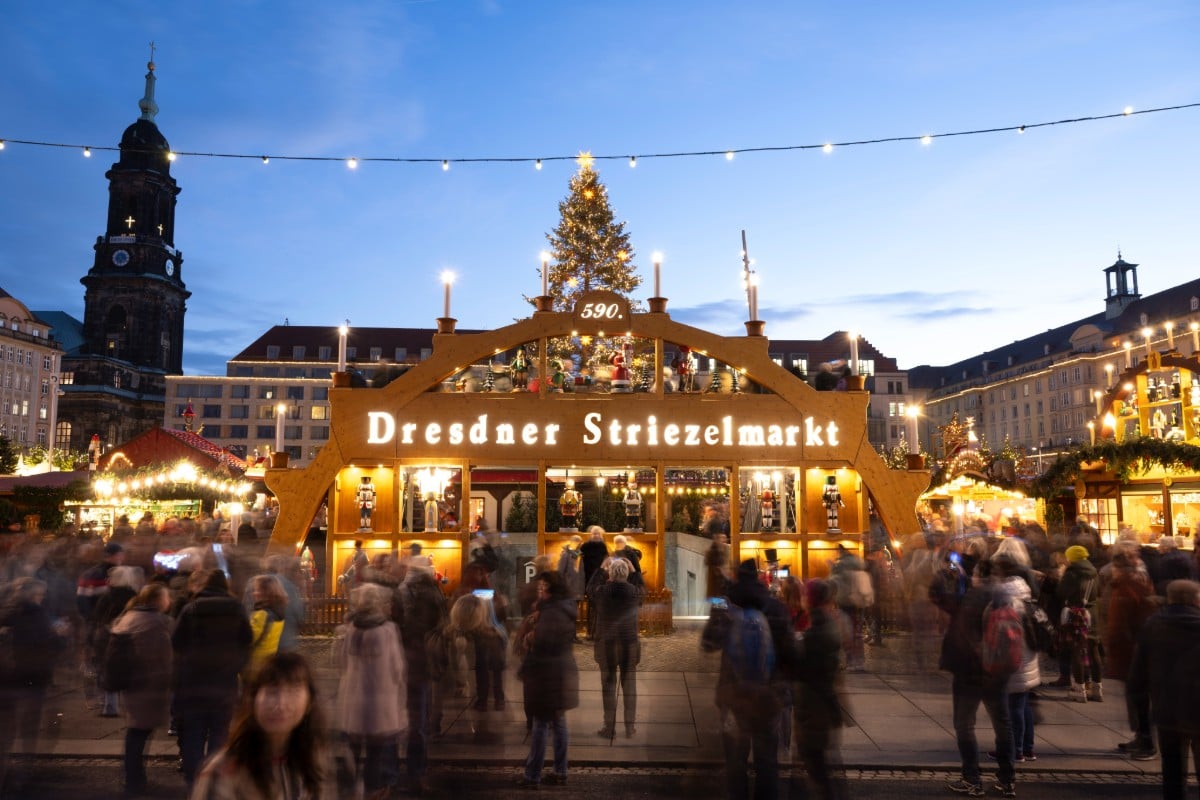Millions of people look forward to Germany’s world-renowned Christmas markets. Why are various social media users saying that markets are cancelled this year?
It’s not yet November but many people are already looking forward to sipping Glühwein (mulled wine) at Germany’s beloved Christmas markets: Weihnachtsmärkte.
However, claims are circulating on social media, and in at least one publication, that many markets are cancelled this year, citing increasing security costs and terror concerns.
Yet this information is largely false – the vast majority of markets are going ahead as planned.
What’s do the claims say?
One such TikTok video, that has received more than 690,000 views, says: “Christmas is around the corner, Germany is CANCELLING their markets… and it also looks like other places in Europe are going to do the same.”
Meanwhile, a post on X, with 25,000 likes, says: “HUNDREDS OF CHRISTMAS MARKETS IN GERMANY CANCELLED.” It cites a publication called Duna Press that has a report on markets being cancelled.
Another post on X by an account called WallStreetMav, which has over 1.6 million followers, posted: “The vast majority of Christmas markets are going to be canceled in Germany due to ‘security costs that are too high.’
“The police and authorities are incapable of preventing terrorist attacks. They are ‘overwhelmed.'”

Dresden’s famous Striezelmarkt. Photo: picture alliance/dpa | Sebastian Kahnert
What’s actually happening?
Germany hosts more than 2,500 Christmas markets, sometimes known locally as ‘Advent markets’ or ‘Christkindl markets’, every year.
It is the case that many have introduced costly security measures in recent years to increase safety for guests following the deadly terror attack on the Berlin Christmas market in 2016, and other similar horrific incidents such as the Magdeburg attack last year.
These include measures like concrete barriers, extra security staff, CCTV and, in some cases, bag checks.
READ ALSO: Germany urges vigilance at Christmas markets amid terror concerns
However, Germany is proud of its Christmas market season and The Local has heard no reports of mass closures. We have also not seen any reports about cancellations among reputable sources.
Advertisement
State broadcaster Deutsche Welle recently investigated the claims and also found there to be no real truth behind them. Although the outlet said there have been “isolated cancellations of smaller local markets”, DW said “there is no evidence – nor any official confirmation – of widespread closures across the country”.
Most markets in Germany start the week before the first Advent, which this year falls on Sunday, November 30th.
In Berlin alone, the city’s official website lists a total of 63 markets taking place this year. Two of the most popular – the Weihnachtsmarkt am Gendarmenmarkt and the market at Alexanderplatz – open on November 24th.
Dortmund’s ‘Weihnachtstadt’ starts on November 20th. Dresden’s Striezelmarkt opens on November 26th, while Nuremberg’s Christkindlesmarkt begins on November 28th.
READ ALSO: An essential guide to Bavaria’s Christmas markets
What’s the source of the claims?
The article by J&M Duna Press, which was published on October 18th, appears to be the source of all the claims. The publication describes itself as part of an “independent, communication and education” group.
The article reports that organisers in smaller towns cite “unaffordable security costs” – said to be linked to recent terror attacks – as the main reason for cancellations, mentioning only two examples: Rheinfeld and Schongau.
Advertisement
DW investigators reached out to authorities in Schongau, Bavaria and Dormagen, North Rhine-Westphalia (which includes a district named Rheinfeld). A spokesperson from Schongau said: “The 2025 Christmas market will take place as usual.”
A spokesperson from the city of Dormagen said: “In previous years, there was no Christmas market in the Dormagen’s district of Rheinfeld, and none is planned for 2025 either.”
DW further points out other questionable parts of the publication: “All images, including author portraits, are AI-generated, raising questions about the authenticity of the contributors. The only contributor with a real photo and social media profiles is Paulo Fernando de Barros, listed as managing editor.
“Duna Press Magazine’s social media profiles have very few followers and their posts receive minimal interaction, suggesting limited credibility or audience trust.”
It seems that the claims on social media have stemmed from this seemingly false news report.
As we mentioned, although Germany’s markets are having to think about security more often – and at times introduce expensive measures – there is no evidence of widespread cancellations.
Disclaimer : This story is auto aggregated by a computer programme and has not been created or edited by DOWNTHENEWS. Publisher: thelocal.de






